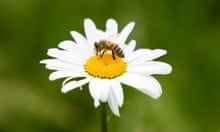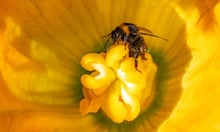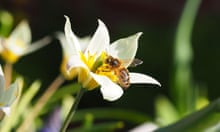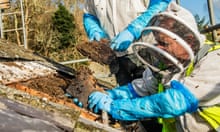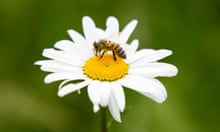Scientists have developed a “vaccine” for bees against pesticides – and it appears to work, according to an initial study.
According to the findings, published in Nature Sustainability, hydrogel microparticles fed to bumblebees in sugar water caused a 30% higher survival rate in individuals exposed to lethal doses of neonicotinoids, and significantly milder symptoms in those exposed to lower doses that would not usually be lethal but can cause harm.
Neonicotinoids harm bees’ nervous system, paralysing and ultimately killing them. They are used to to control a variety of pests, especially sap-feeding insects such as aphids, and root-feeding grubs.
Scientists from Cornell University in New York were trying to find a way to protect bees from the widely used pesticides. Neonicotinoids were totally banned in the EU only last year – a previous ban allowed their emergency use. The UK has allowed their use every year since 2021, but the Labour government has said this will stop. The pesticides are still used in many US states.
The researchers found that the microparticles physically bind to the neonicotinoids and once absorbed, the pesticides and microparticles pass through the bee’s digestive tract and are excreted, without causing the same harm. The antidote has the potential to be selectively applied to other pesticides.
This treatment improved the bees’ motivation to feed and led to a 44% increase in the number of bees able to walk a route mapped by scientists. Bees become so unwell that they are unable to flap their wings when they are exposed to neonicotinoids but, using a high-speed camera, the researchers found that impaired wingbeat frequency after exposure improved significantly with the treatment.
“Bees are crucial for crop pollination and agriculture and food security, so it’s important for people to take bee health seriously,” said the lead author, Julia Caserto.
She added that this could help mitigate the effects of pesticides, which are still widely used. “We want to try and overcome these pesticide exposures in managed bees so that we can still have sufficient crop pollination for us all to be sustainable,” she said.
after newsletter promotion
Next, scientists hope to test the treatment on honeybees, which are smaller and so may have different reactions to pesticides and the microparticles.

